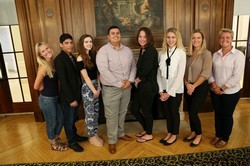Eight students participated in this year’s Summer Scholars program. The students were from six different departments, each guided by a faculty mentor.
21 applications were reviewed from across the University, and the following were selected: Kaitlin Allsopp (Political Science), Emily Blaser (Communication), Megan Conchar (Psychology), Emma O’Rourke (Political Science), Jenna Puglisi (English), Nathaniel Rodriguez (Mathematics), Marta Telatin (Biology MCP), and Sebastian Vera (Biology MCP).
This group worked on their individual projects throughout June and July.
The program provides a stipend, a budget to complete the project, and housing for the summer months.
I personally completed a creative writing project, which is a short collection of poetry. It uses the natural elements to frame a love story, with our local environment providing inspiration to the imagery.
This program allowed me the chance to place all my focus on my writing, which is something that I rarely have the chance to do.
Now that the writing is done, I am submitting my work to poetry magazines.
While our topics were very diverse, my fellow peers had similar positive experiences.
For instance, Vera said, “My project was a diet-induced model, where I was looking to determine how a high-fat diet changes aspects of body size. I also looked to see how these changes vary among strains from different environments.”
Considering the impact that the program had on him, Vera said, “Summer Scholars allowed me to make strides in my program because of the provided housing.”
He continued, “Over the summer, the Phifer-Rixey Lab was able to transform a vacant space into a functional animal facility!”
Another student studying science, Telatin said, “My research is on the Neuropharmacology of Alcohol-Stimulant co-use. Our research hopes to bring a comprehensive understanding of the effects on the cellular makeup of the brain, after the consumption of alcohol alone or with a paired stimulant.”
She continued, “The program was amazing because it gave the chance for students to focus on research and be in an academic setting.”
Conchar spent her summer speaking with people across the country, and she is still conducting interviews. Her research centers on secondary traumatic stress in veterinarians and animal rescue workers. She said, “My study aims to determine the risk factors for the negative psychological effects related to this field of work.”
Blaser conducted research on a very prevalent topic. She said, “I worked with Dr. Shamrock this summer to research the #MeToo Movement. We examined if there were differences in how women’s interest magazines and men’s interest magazines portray the #MeToo movement.”
She continued, “We are currently in the process of rereading magazine articles and categorizing them.”
Heidi Bludau, Ph.D., lecturer of history and anthropology, organized the program.
In regard to her experience, she said, “My primary goal this year was to build a community of scholars among the group, and I believe we did that.”
She continued, “What was most enjoyable was seeing the students interested in each other’s projects, even if they were extremely different than their own.”
For students interested in participating in the program this upcoming summer, expect some minor changes.
Bludau said, “This year, we plan to announce the program in late fall, giving students and faculty more time to collaborate on project proposals. We will also be developing the learning community into a living and learning community, in which students will be required to live on campus.”
This program is a great way to challenge yourself academically beyond the classroom.
All 2018 participants will make presentations during the spring semester’s Scholarship Week.
Next summer’s application will be available soon, so keep an eye out, future scholars!
PHOTO COURTESY of Tom Zapcic



